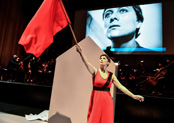OPERA SEARCH

Jeanne d'Arc
(2018/19)Libretto by Kristine Tornquist (G)
M,A,Bar; 2trebles; mixed chorus(with 2soli);
2(I=picc,II=afl,bfl).2.corA.2(II=Ebcl).bcl.dbcl.2.dbn-4.3.2.1-perc(3)-harp-sampler(=cel)-org-strings
Abbreviations (PDF)
Bote & Bock
Stadthalle, Villach
Conductor: Johannes Kalitzke
Company: Kärtner Sinfonieorchester
Congress Center, Villach
Kristine Tornquist, director
Conductor: Johannes Kalitzke
Company: Kärtner Sinfonieorchester
| Jeanne | Mezzo-soprano |
| Mother / 1st policeman | Alto |
| Father / 2nd policeman | Baritone |
| Angels | 2 soli from chorus |
| 2 treble voices | |
| mixed chorus |
Already the neologism “movie-church-opera” as generic name gives a hint of the scope of the project: the layers of the “silent” movie pictures from Carl Theodor Dreyer’s La Passion de Jeanne d’Arc (1928), a continuative dramaturgy, and a newly composed and live-performed “soundtrack” require a well-thought-out interlinking. The new concept of a contemporary film music to classic silent movies represents a focus in Kalitzke’s oeuvre of the second decade of the twenty-first century: his scores to the movies Die Weber (The Weavers, 1927), Orlacs Hände (Orlac’s Hands, 1924), and Schatten (Shadows, 1923) employ a modern tonal palette and establish self-assured idiosyncratic focal points, but also work out the masterful aspects of the film pictures from the early phase of cinematic art. In the music, the composer thus always reflects the artistic intention of the movie maker and the applied cinematic stylistic devices, including experimental cutting techniques and unusual perspectives.
Besides three soloists, a full symphony orchestra, and choirboys, in Jeanne d’Arc the composer also takes recourse to electro-acoustic sounds for the depiction of the inner world of the figures. With an additional dramaturgy – the librettist Kristine Tornquist is responsible for the extra scenes – a cross-genre work with psychological profundity comes into being.
The music to the movie Passion by C. T. Dreyer is based on a paraphrase of the Missa l’homme arme by G. Dufay.
In the sense of a variation cycle, it evolves on the basis of the classical requiem text like a new mosaic with old stones, also in view of the electronic expansion of the orchestral formation in the sense of sequential derivatives of the original material.
There are three parts: earth – heaven – hell (analogous to negotiation – transfiguration – annihilation) that reflect the inner processes and transformations of the protagonists. Illustrated is thus less the external events than that what happens with the active figures during the course of the process.
The contrast of nightmarish distortions of facial expressions and gestures on the one hand and promises of salvation aimed at the hereafter on the other hand, which inform the movie, serve as the thematic model for the musical portrayal of figures and situations, and for the confrontation and integration of the musical epochs.
In this connection, the “vertical” and woodcut-like cutting techniques of the film become the basis of the musical form.
Johannes Kalitzke, January 2019
Dramatic, Tragic
